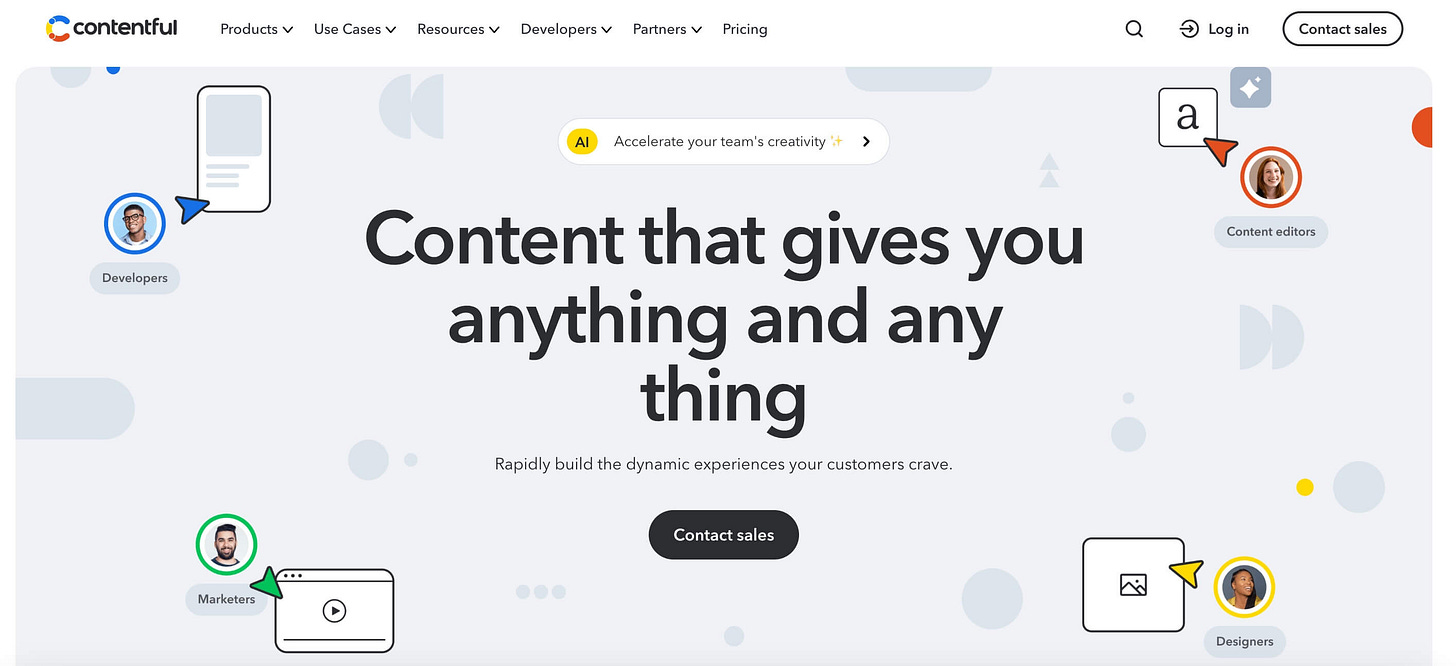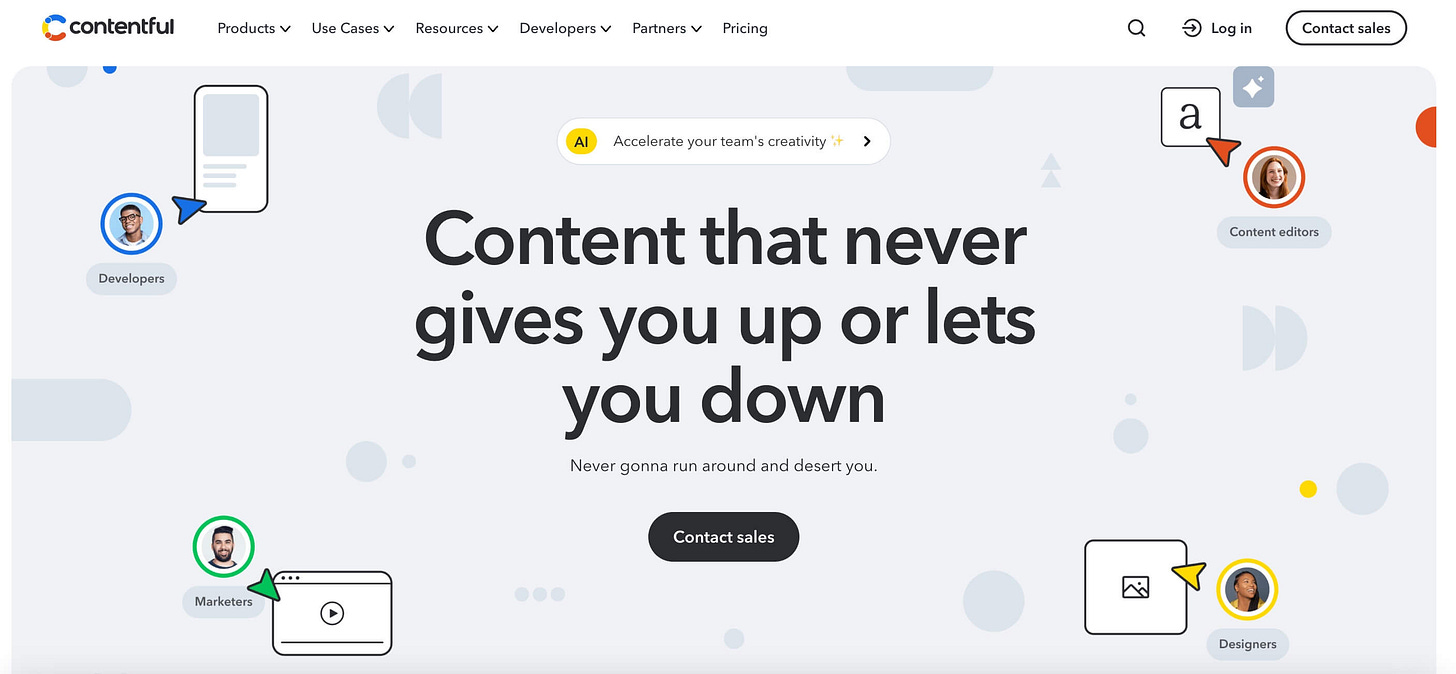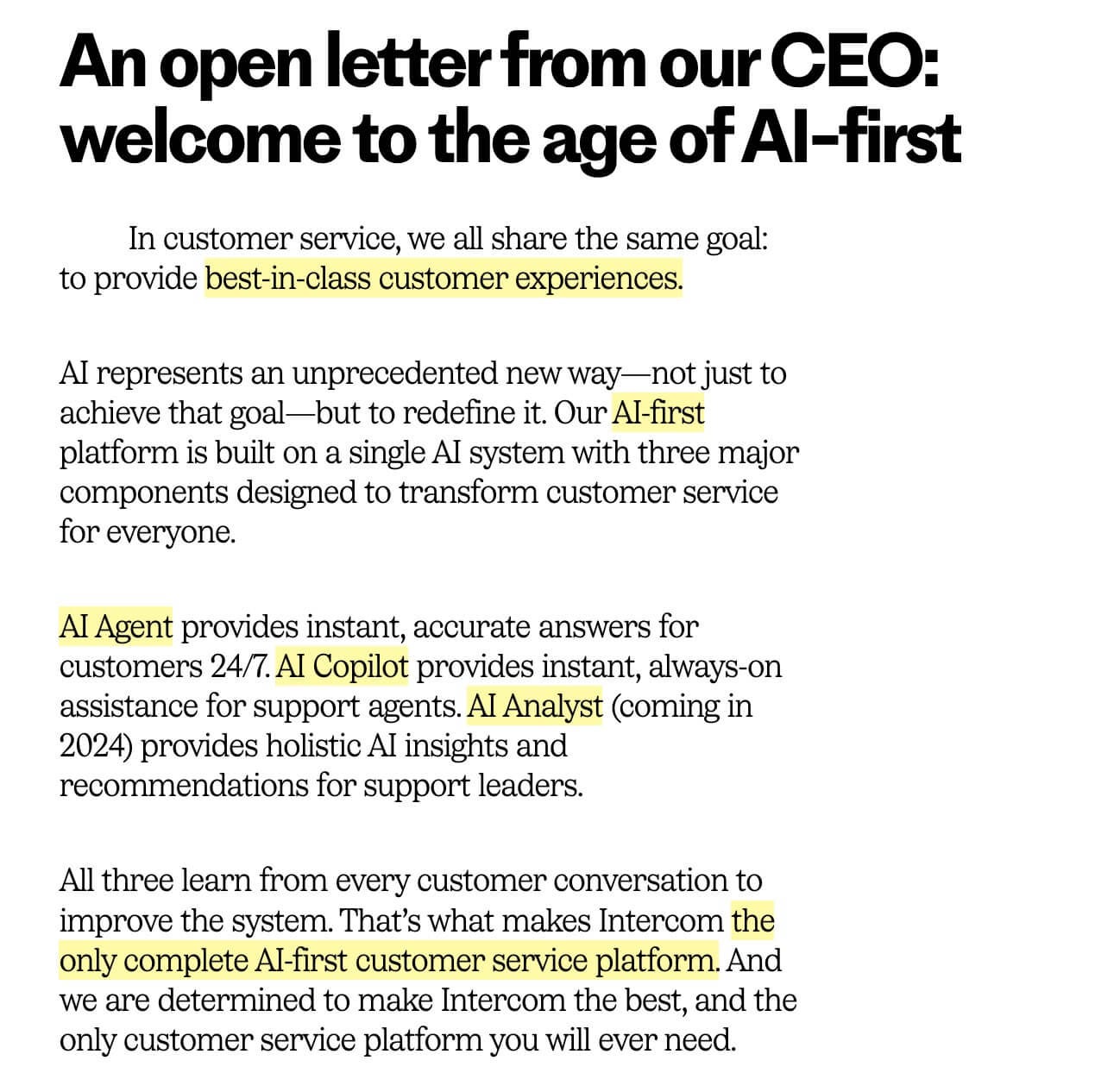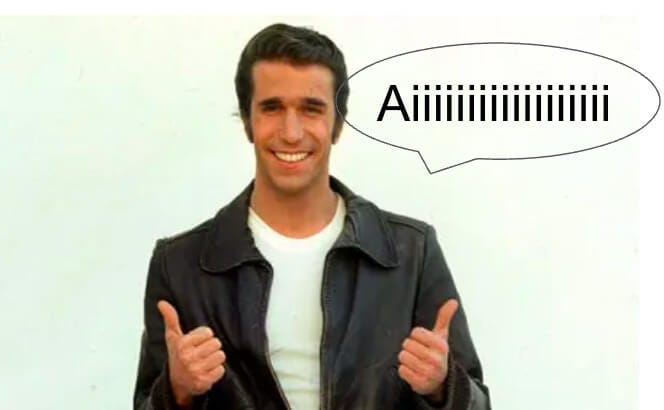How many ways can you say "we fired people"?
And how many times can you use 'AI' on your homepage? Answer: Many times.
Hello Gobbledeers,
How’s it going?
Today we’ll be talking about:
Ways to say “we’re firing people” without saying “we’re firing people”
Words that sound like they mean something, even though they don’t
How many times can you say “AI” on your homepage.
But first - a quick advertisement for me:
I’ve been working with clients on a quick way for them to improve their website messaging, because I’ve learned that not everyone is ready for a 2-day workshop. This initial group has made huge improvements in the clarity of their messaging, and they can make those changes within the week.
Here’s how it works: You pick 3 pages on your website. I’ll go through those pages word-by-word and provide feedback and copy ideas to make your message clear. Easy, and also peasy. Because I want as many companies as possible to have clearer messaging, the cost for this is just $1,000. As a client just wrote to me, “We are so glad we got your help!” You’ll be glad too.
Just fill out this quick form and we’ll get your messaging fixed in no time. (Or if you’re too lazy to fill out a form, just send me an email at jared@sagelett.com).
(End of commercial.)
You’re Now the Recipient of an Element of a Resource Action
If you’re one of the poor communications professionals who is asked by the CEO to come up with a new euphemism for “we’re firing people,” I’m very sorry.
Companies have been firing people for eons, so I would’ve thought that all of the ways to say, “we’re firing people” have been taken. Longtime Gobbledy readers, for example, may remember the CEO of Cloudflare saying that “team upgrades are always hard.” “Team upgrades” being how the modern tech CEO might say, “we’re firing people.”
So I have to give credit to the communications professionals at PricewaterhouseCoopers, who had their work cut out for them when they announced (free article from the Wall Street Journal) they were firing a bunch of people last week. Well, obviously they didn’t announce they were firing a bunch of people - I wasn’t expecting an announcement that said, “Shit isn’t going as planned, so we’re going to fire 17,000 people.”
No, they are professionals. So when they were told that the professional services firm needed to fire some people, they came up with a memo from the CEO that said this:
“There will be an element of resource action that will impact a relatively small proportion of our people, something that is never easy.”
AN ELEMENT OF RESOURCE ACTION!
If I were to be named the Senior Vice President of Corporate Communications for PricewaterhouseCoopers, and I were to remain in that role for 1,000 years, I would never be able to come up with a euphemism as incredible as “an element of resource action” to describe firing a bunch of people. I am honored to be alive to witness that.
I am less honored to be alive to see a flaming pile of sentence construction like whoever felt compelled to tack “something that is never easy” onto the end of that sentence. What is it referring back to? What is the thing that is never easy? “An element”? This memo went out from the CEO…did nobody read it? Or did absolutely everybody read it and that’s how you end up with an element of resource action, something that is never easy?
I also enjoyed this cherry-on-top from the WSJ article:
“The executive said he would be remiss if he didn’t acknowledge the announcement was being made on Sept. 11, a day on which the firm lost five colleagues.”
So, to recap:
PwC took an element of resource action, something that is never easy, while acknowledging they were announcing this never-easy resource action on the anniversary of 9/11, a solemn day for the firm because they lost five employees, yet not so solemn that they didn’t wait until, say, September 12th to announce the aforementioned resource action, something that is never easy.
Anywhere, everywhere, and any and every where in between…
Here’s a little palate cleanser from content management system Contentful…
I’m guessing the AI prompt was: “Please write 8 words in the English language that, when placed next to each other, sound as if they mean something but, upon further examination, mean absolutely nothing. Then, write ‘contact sales’ under it.”
It’s kinda fun. Here are a some alternatives I’ve come up with:
An AI-first headline, powered by AI…AI
If, like literally every company I’ve spoken with in the last 18 months, you feel the need to squeeze in as many references to “AI” as possible on your website, maybe you should back off a bit.
If you have a moment, it’s worth a quick skim through the abstract of this study in the Journal of Hospitality Marketing & Management (you probably have it on your shelf, as it was their Swimsuit Issue), which found that consumers are less likely to purchase a high-risk product (though they didn’t specifically call it out, enterprise software would be an example of this) if the product is described as including “artificial intelligence.”
So for software marketers, one approach might be to take references to AI off the homepage, and instead include them on product pages when providing more detail about how the product works.
That’s one option.
The other option is to tell the authors of that study to go f- themselves.
Customer service software platform Intercom has taken that approach:
It’s AI-first, an AI-first totally new way that’s powered by AI with an AI agent and AI copilot and AI insights. (“Totally new way” is much more than a “new way.” Totally.)
Then, under that, they’ve included an “Open Letter” from the CEO really hitting the point home, if you somehow missed it earlier:
I didn’t make those yellow marks - they’re on the website to really make sure you understand that there’s AI involved in this product.
And I know I’m a picky son-of-a-gun, but the grammatical errors are inexcusable. Take this sentence: “AI represents an unprecedented new way - not just to achieve that goal - but to redefine it.” You can use an em dash like that to set off independent clauses - unfortunately, “but to redefine it” is not an independent clause. In other words, you should be able to remove the words inside the em dash and the sentence should still make sense. In this case, it does not.
(Look, I know that picking at grammatical mistakes is annoying and somehow reflects worse on me than on the people who allowed those mistakes on the website, but this is - allegedly - a letter from the CEO. And can you imagine a world where, I dunno, Tim Cook would allow grammatical errors in a letter attributed to him? Those mistakes are in there because nobody cared enough to take them out, and that makes me nuts.)
Am I done? No. No I am not.
Because that last sentence is also wrong: “And we are determined to make Intercom the best, and the only customer service platform you will ever need.” I’m about 99.5% sure they mean, “We are determined to make Intercom the best - and only - customer service platform you will ever need.” I don’t think they’re saying “we are determined to make Intercom the best…and also, it will be the only customer service platform you will ever need.”
(If you weren’t interested in this nitpickery, why would you be reading this newsletter?)
Anyway, I did enjoy the part where he mentions that the “AI-first” platform is built on a single AI system with three major components. And then they list the three components, while noting that one of the components is “coming in 2024.” My math may be off, but I believe that means there are two components, plus 1 component that has not yet been invented. Like if I told you the Gobbledy newsletter is just one part of a single media company that has 173 publications. One of those publications is Gobbledy, and the other 172 haven’t been created yet.
And to celebrate these two, possibly three major components, they’ve hired a new spokesman:
As always, thanks for reading to the end. I’m always happy to chat with readers about whatever they’d like to chat about - it’s up to you! Here’s my Calendly link if you’d like to set up half an hour to meet up.
(And I’d love to help you improve your site messaging, either with a quick copy review or a 2-day workshop. Let’s chat - I’m at jared@sagelett.com)











Jared, your evocative syntax redefines the ethereal narrative paradigm.
I'm here for the nitpickery.